Altared States
 How the National Same-Sex Marriage Debate Affects Alumnae
How the National Same-Sex Marriage Debate Affects Alumnae
Ellen K. Wade ’70 made history by marrying her longtime love, Maureen Brodoff, on May 17, 2004, the first day state-sanctioned same-sex marriages were legally performed in the US. While they were celebrating with other gay and lesbian newlyweds across Massachusetts, Cynthia Taylor Curtis ’60 was praying with the Berean Bible Church in Michigan for the end of same-sex marriages—or as she puts it, “for five smooth stones to fell this giant which has defied the armies of the living God.”
Pro and con, Mount Holyoke alumnae are at the very center of this contentious national debate. MHC women have sued for the right to wed; given legal advice to anti-gay-marriage groups; helped draft same-sex marriage legislation; counseled Catholic youth that homosexual relationships cannot be marriages; and faced imprisonment for performing same-sex marriages. In addition, alumnae have taken public positions for and against same-sex marriage through petitions, letters to the editor, and lobbying efforts.
Views of the alumnae who contributed to this article apparently don’t reflect the average American’s opinion. While an early May NBC News/Wall Street Journal poll found that half of those surveyed would favor amending the US Constitution to ban same-sex marriages, the vast majority of alumnae interviewed for this article support gay marriage.
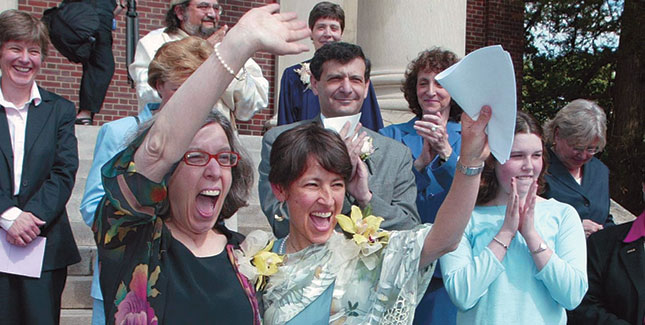
Ellen Wade ’70 (right) and Maureen Brodoff wave to cheering well-wishers on the steps of Newton, Mass., City Hall following their May 17, 2004, marriage ceremony. Daughter Katie Wade-Brodoff stands clapping at far right. Photo by Jim Rogash
Three years ago, Ellen Wade and partner Maureen were ready to say “I do,” but the law still said “No you don’t.” So in 2001, they started the push for gay marriage by requesting a license at Newton City Hall, having discussed possible legal action if they were refused. “There were moments of confusion while a clerk wondered where the grooms were. Then she realized what was happening, excused herself, came back, and politely turned us down,” Wade recalls. “We knew that would be the answer, but it hurt.” Deciding to press the issue, they—along with six other same-sex couples—sued for the right to marry.
In November 2003, the Massachusetts Supreme Judicial Court responded with its landmark ruling that denying marriage to same-sex couples violated the state’s constitution. When the decision was announced, Wade was at the microphone in front of the nation’s press corps, and she spent the following days being interviewed by journalists from all over the country. The decision “was the outcome we thought we were entitled to,” Wade recalls, “But none of us dared believe it was actually going to happen, so it was thrilling.”
The decision was the outcome we thought we were entitled to. But none of us dared believe it was actually going to happen.
Ellen Wade ’70
Despite being at the epicenter of the controversy, Wade is not waving signs at every rally. “We’ve tried to stick to our role as plaintiffs, not activists. We’re not out there on the barricades,” she explains. “But I have done some speaking, been down to the Statehouse, and have certainly talked with my legislators. A lot of the past three years, I’ve just led my normal life, but [the court case] has definitely been a presence.”
If the advice of Harvard Law School professor Mary Ann Glendon ’59 had been heeded, same-sex couples would not be making their way to the alter. She has been quoted frequently in media reports as the leading legal advisor for gay-marriage opponents in Massachusetts. According to the March 10 Boston Globe article, “Glendon’s views are helping to drive the gay-marriage debate. She met at least once with Governor Mitt Romney on how to draft a bill that defines marriage as a union of a man and a woman but toes the line drawn by the Supreme Judicial Court. Glendon also has consulted with gay-marriage opponents. ‘She has been kind of on-call, someone to give us legal opinions on various language proposals, and she has been helping us to understand various proposals offered by legislators’ said Ron Crews, spokesman for the Coalition for Marriage. ‘When someone like professor Glendon Speaks, she speaks with authority and is well respected.’”
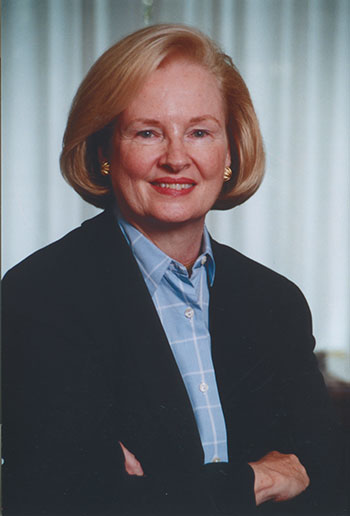 Although she declined our interview request, Glendon has been outspoken in print, largely through newspaper editorials. In a widely quoted January 8 Boston Herald piece, Glendon argued that the state should delay implementation of same-sex marriage and that, instead of trying to amend the state constitution to bar these unions, the legislature should clearly state “the rational bases for reserving the status of marriage to one man and one woman.” In a February 25 Wall Street Journal editorial, she wrote that “what same-sex marriage advocates have tried to present as a civil-rights issue is really a bid for special preferences.”
Although she declined our interview request, Glendon has been outspoken in print, largely through newspaper editorials. In a widely quoted January 8 Boston Herald piece, Glendon argued that the state should delay implementation of same-sex marriage and that, instead of trying to amend the state constitution to bar these unions, the legislature should clearly state “the rational bases for reserving the status of marriage to one man and one woman.” In a February 25 Wall Street Journal editorial, she wrote that “what same-sex marriage advocates have tried to present as a civil-rights issue is really a bid for special preferences.”
Rev. Dawn Sangrey ’63 believes “The civil rights of homosexual people are essential to the forward movement of freedom and democracy in the country.” Sangrey was drawn into the controversy on March 6, when she and a colleague officiated at weddings of thirteen same-sex couples. On March 15, she was arrested, one of the first two clergy criminally indicted for solemnizing marriages for unlicensed couples. A conviction could bring a year in jail, and news of the charges appeared in newspapers as far away as Australia.
Sangrey serves the Fourth Unitarian Society of Westchester, New York. When Jason West, mayor of nearby New Paltz, was served with a court injunction forbidding him to solemnize any more same-sex marriages, his aides began to cancel weddings they already scheduled. One of those couples included Sangrey’s friend Rev. Kay Greenleaf, who volunteered to fill in for West. Greenleaf asked Sangrey for help, and together they married thirteen couples in front of some 200 well-wishers—and the local police. After confirming that Sangrey and Greenleaf were breaking the law, the county district attorney issues arrest warrants. Misdemeanor criminal charges were delivered to her lawyer—“no handcuffs, no drama”—and Sangrey expects to go to trial this summer. She continues to perform weddings and to speak publicly, “I’m grateful to have been, almost by accident, a part of this,” Sangrey says. “And if the good citizens of New Paltz decide I need to spend a year in jail to demonstrate my convictions, I am willing to do it. I needed to be able to look in the eyes of gay couples and say, ‘Your love is just as good.’”
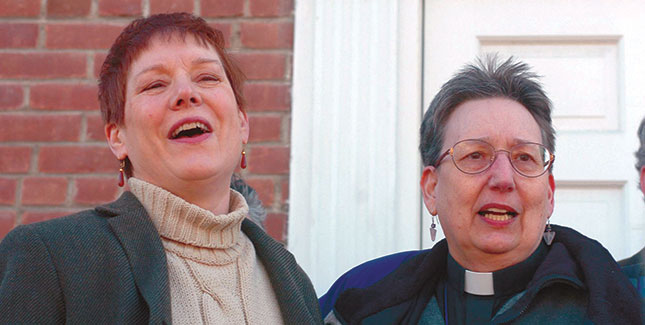
Ministers Dawn Sangrey ’63 (left) and Kay Greenleaf lead a crowd of supporters in a hymn in front of New Paltz, NY, courthouse on March 22, 2004. Later, they were arraigned on criminal charges for officiating over same-sex weddings. Photo by Tim Roske, AP≠
Marriage Rights, or Wrongs?
That’s not a view typically embraced by opponents of gay marriage. While all alumnae opposed to same-sex marriage interviewed for this article emphasized that they don’t disparage homosexuals as individuals, some clearly disapprove of both gay marriage and homosexuality itself.
In one of her letters to the Cheboygan Daily Tribute, Cynthia Taylor Curtis ’60 wrote, God “has forbidden homosexual behavior since He first gave us His law… and no nation in history which has embraced such behavior has survived. It could not. Sadly, those who pretend that God’s unchangeable law is not for them hurt not only themselves but also those around them.” She finds attempts to institute same-sex marriage “a very sad move” that will harm individuals, families, and marriage itself. She speaks of praying for guidance about presenting her message in a way that will “connect with people’s hearts,” and says, “as God designed, only the mating of a man and a woman can reproduce the species. Not much is being said about kids, but they are our future. Research shows that they thrive best in a stable home with a mother and father. To subject future generations to a chaotic alternative will lead to societal meltdown at every level.”
“Redefining [marriage] through humanly devised legislation and practice cannot change the natural laws of gravity… and would only be destructive to the foundations of our culture and country,” says Elizabeth Tuttle Claver ’69. As a leader in the United Church of Christ’s Biblical Witness Fellowship, she has written frequently to churches and legislators urging the retention of the traditional definitions of marriage. She feels strongly that “marriage is not a political or a civil-rights issue because it is part of God’s natural moral order.”
![Youth Minister Amy Auzenne ’97, shown at home with son Bennet, says, “We need to make sure people are treated fairly, but I don't think the answer to [discrimination] is redefining marriage.”](https://alumnae.mtholyoke.edu/wp-content/uploads/2016/10/Auzenne.jpg)
Youth Minister Amy Auzenne ’97, shown at home with son Bennet, says, “We need to make sure people are treated fairly, but I don’t think the answer to [discrimination] is redefining marriage.”
“A lot of the issues that people pushing for same-sex marriage are bringing up are valid,” she acknowledges. But she hopes that, instead of redefining marriage, legislators will “pass laws that allow people to decide who they want to visit them in the hospital, to be covered under their heath insurance, and to make life-or-death decisions for them. Such laws would benefit everyone.”
“Lots of my young people are fairly homophobic,” Auzenne explains. “My role is to explain what the church teaches and to help them develop compassion for people who are different from them, but who are called to live the Gospel just as they are called.” She considers her youth ministry “my activism, empowering them and giving them knowledge to have respectful conversations about the issue.” She adds, “This is Texas; you aren’t going to see the mayor marrying same-sex couples on the steps of city hall any time soon!”
I tell my young people that a same-sex relationship may be many things, but it cannot be a marriage.
Amy Auzenne ’97
Probably true, but legal marriage is precisely what some gay and lesbian couples are anxiously awaiting—and not just for romantic reasons. According to the Human Rights Campaign, a pro-gay-marriage group, married couples receive some 1,000 federal legal benefits. “Money and legal rights” are the bottom line for Margo Burns ’79, who had a 2001 civil union in Vermont with Marilyn Lloyd. “Last year, for example, I added her to my health insurance. We had to prove that we cohabitated for at least one year before they would allow it. Heterosexual couples only need their marriage license, and coverage starts immediately,” Burns says. “Then there’s the health insurance. [Due to differences in policies affecting gay and straight couples], I pay taxes on $4,000 more annually than my heterosexual counterparts.” Nancy Skinner Nordhoff ’54, an MHC trustee who founded a writers’ retreat in Washington State, says she and her partner of fifteen years, Lynn Hays, want “the common benefits and protections available to married couples, such as estate planning and how a hospital treats a patient’s partner. I’ve talked to my attorney about distribution of my property and asked if this will hold up [legally], but I’m not sure I can trust him. It would give me much more security knowing that what we built together would be passed on.”
Even without full marriage rights, some couples already consider themselves wed. Suzanne Franchetti ’91 and Naomi, her partner of ten years, had a full-fledged Jewish wedding six years ago, complete with ketubah, broken glass, and long white dresses for both brides. Elizabeth Simon Ruchti ’97 and partner Lisa Huebner are calling their summer ceremony a wedding though it won’t legally marry them. “We couldn’t be more excited and don’t really care if it is legal or not,” Ruchti explains. “It wasn’t legal for us to love each other, yet we are madly in love.”
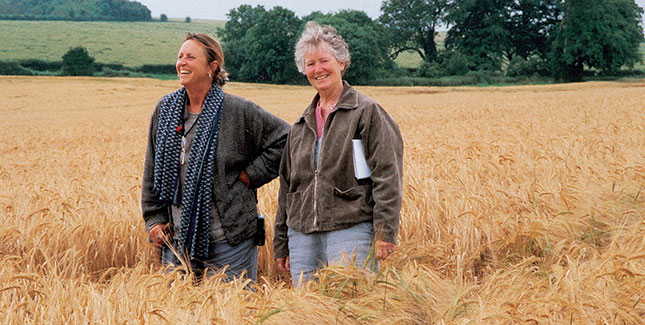
Nancy Skinner Nordhoff ’54 (right) with partner of fifteen years Lynn Hays says she just wants “the common benefits and protections available to married couples.”
Cause, or Concern?
Activism—from private conversations to full-out lobbying—is also on the agendas of alumnae on both sides of the issue. When Pamela Thiele ’70 and Lauren Fortmiller went public about their 2002 wedding, they were on the cutting edge. “Most gay-rights organizations were not promoting gay marriage as something to lobby for immediately,” Thiele recalls. It was such news that we made the New York Times Sunday “Weddings/Celebrations” sections, which had only recently started publishing announcements of gay unions. It was also news because Fortmiller was mayor of Sag Harbor, New York, and the only US elected official to have a gay wedding while in office, according to Thiele. “We felt we had to [go public] to indicate the level of out commitment and to be a positive example to younger gays.” Today, they are fighting an anti-gay-marriage amendment through the Human Rights Campaign. Thiele has marched in gay-rights parades and handed out fliers, and plans to “have a series of afternoon teas at our house for community people to discuss same-sex marriage—not to lobby, but to inform.”
Over the past year, lawyer Pat Coville Rapinchuk ’79 has “definitely become more involved in state politics, at least in part because of this issue.” She was a member of the Massachusetts Bar Association Same-Gender Marriage Task Force, wrote columns for the Women’s Bar Association (WBA) newsletter, helped write press releases and a letter to the editor of Massachusetts Lawyers Weekly, lobbied the legislature, and encouraged WBA members to contact their legislators. As president of the WBA, she also represented the group at a Statehouse rally.
Nancy Nordhoff isn’t the rallying, placard-carrying type, but she says the issue is making her become more of an activist. “I’ve never marched in the gay-pride parades, but voices are needed now and I am going to step up” by writing letters and talking to politicians about the issue.
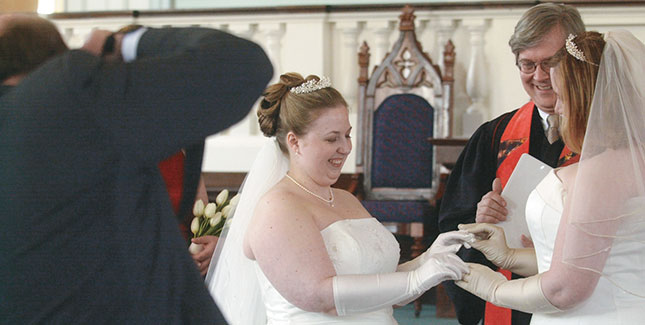
Christine L. Quirk Holley-Williams ’97 (right) and Sabrina A. Ash Holley-Williams ’97, who exchanged rings in a Valentine’s Day commitment ceremony in 2004, are unlikely newlyweds. “While at MHC, I remember voicing my disgust that lesbians might ever condescend to participate in such a patriarchal, heterosexual institution as marriage,” recalls Quirk. “I guess that proves how much can change in nine years.” Photo by Belmont Citizen-Herald/Holly Schmidt
Opponents of homosexual marriage are also making their views known. This spring, Susannah Fischbach Seidensticker ’62 wrote to the Chillicothe, Ohio, newspaper encouraging the community to enter the “important national debate which involves whether our society should legitimize, sanction, and promote same-sex marriages.” Her view is that “lesbians and gays may have marriages in time to come, but it’s not time today.” Marriage laws should not change, she believes, because “we’re a culture of tradition.” Seidensticker notes that she has welcomed into her home lesbian couples and their children; she just doesn’t think same-sex couples should marry. Civil unions are “a whole other notion. If they want to have that, fine, but don’t mix it up with traditional marriage.”
Civil unions were also what Massachusetts State Senator Linda J. Melconian ’70 supported—until recently. The cosponsor of three bills promoting domestic partnership says, “Six months ago, I was opposed to gay marriage as ‘going too far.’ Civil unions were not even on the radar screen, we couldn’t even enact a domestic partnership law.” Then the Supreme Judicial Court decision legalizing gay marriage “hit everyone like a thunderbolt.” From January through March the issue was the main focus of her office’s efforts. “I worked with a group of colleagues and advocates trying to impact the outcome, so that it took a lot of extra meetings. I spoke twice to the legislature. But we did not engage in much ‘crafting and drafting’ of legislation. There was much more persuasive diplomacy—talking to members and encouraging them to support the right decision.” Melconian heard from many MHC alums working with Mass Equality (a pro-gay marriage group). She also discussed the issue in depth with the fifty-some students in her January Term course at MHC, Putting the Issues Back Into Massachusetts Politics.
We have to give full marital rights to gay couples. The rights are clearly established in our state constitution, and I would not vote to take away rights. Once I saw it as that kind of issue, there was no turning back for me.
Linda J. Melconian ’70
Personal reflection and other arguments helped Melconian’s position evolve. “I realized we were changing the whole social fabric of our state and the impact that would have on out nation,” but that the “middle ground” of civil unions had been eclipsed. “We have to give full marital rights to gay couples,” she says. “The rights are clearly established in our state constitution, and I would not vote to take away rights. Once I saw it as that kind of issue, there was no turning back for me.”
On May 17, Ellen Wade and Maureen Brodoff turned back—back to the start of their lengthy quest to be married. On the first day gay couples in Massachusetts could legally wed, they returned to Newton City Hall for a marriage license. This time, they got one, along with a waiver of the three-day waiting period, and were married later that day. The city even hosted a public “celebration of equality” afterward. But Wade and Brodoff, like the 150 or so other individuals married that day in Mount Holyoke’s home state, became a couple united in a country still profoundly divided.
—By Emily Harrison Weir
This article appeared in the summer 2004 issue of the Alumnae Quarterly.
Read our most recent article about marriage equality.
October 12, 2016








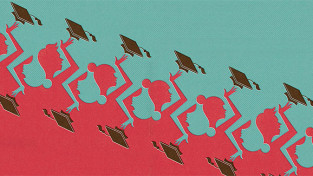

Leave a Reply